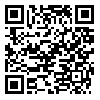BibTeX | RIS | EndNote | Medlars | ProCite | Reference Manager | RefWorks
Send citation to:
URL: http://johe.rums.ac.ir/article-1-110-en.html
Google Scholar

Accepted: 2015/10/27
ePublished: 2015/12/30
Background: The use of psychology in the workplace and accurate scientific findings in this field, in addition to reducing work-related diseases, can promote the performance of employees. Nursing is a stressful job and can be the cause of physical and mental disorders. This study investigates the relationship of personality traits and demographic factors with occupational stress.
Materials and Methods: This investigation was a descriptive-correlational study conducted on 95 nurses of hospitals affiliated to Gonabad University of Medical Sciences, Iran, in 2014. The data collection tools used in this study included the Neuroticism-Extraversion-Openness-Five-Factor Inventory (NEO-FFI) and Osipow Occupational Stress Inventory-Revised (OSI-R). Data were analyzed using spearman correlation coefficient, simultaneous multiple regressions and independent t tests in SPSS software.
Results: No significant difference was observed between the mean score of occupational stress of men and women undergraduate and master’s graduates, and different age groups. The regression model showed that the predictor variables of agreeableness and gender had a significant association with the response variable of occupational stress (P = 0.005). Results showed that the two predictive variables of agreeableness and gender had a negative effect on occupational stress. Nonstandard regression coefficient showed that with 1 unit increase in agreeableness score, the score of occupational stress decreased 1.335 units.
Conclusions: There is an association between the agreeableness personality trait and occupational stress. Thus, we recommend that more attention be paid to this feature as a predictor of occupational stress in nurses.
| Rights and permissions | |
 |
This work is licensed under a Creative Commons Attribution 4.0 International License. |





